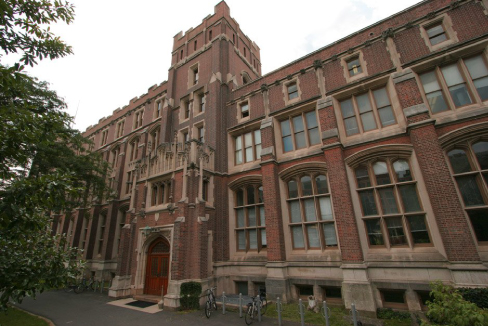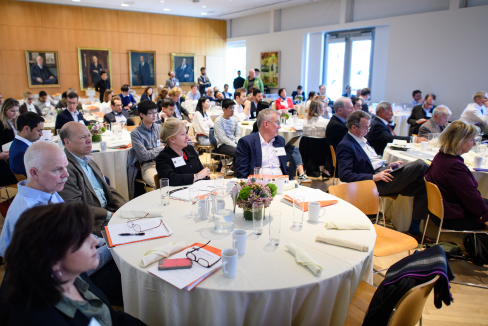The Carbon Mitigation Initiative (CMI) is an independent academic research program that brings together scientists, engineers and policy experts to design safe, effective and affordable carbon mitigation strategies. Sponsored by bp and administered by the High Meadows Environmental Institute, CMI is Princeton university’s largest and most long-term industry partnership. Since its inception, CMI has been committed to the dissemination of its research findings in peer-reviewed academic literature so they may benefit the larger scientific community, government, industry and the general public.
How We Operate
The CMI faculty leadership team identifies the strategic priorities of the program given the intellectual landscape around climate change and carbon mitigation. Currently these priorities are the net zero transition, land-based climate mitigation and alternative fuels. The leadership team discusses with potential principal investigators (PIs) their ideas and research plan for a CMI-supported project and funding decisions are made based on the synergy of the proposed research with the overall program. In general, the CMI supports PIs who have a proven track record of important contributions in the area of carbon mitigation or can pivot their research towards this overarching goal, and are known to be at the top in their fields. The CMI faculty leadership solely determines the research priorities and individual projects to support.
Participants
CMI currently funds 21 principal investigators (PIs) and over 60 researchers and students. Teams of scientists, engineers, and policy experts are working across multiple disciplines to develop solutions to the world’s biggest climate, carbon and biodiversity problems and to mitigate their impacts on societies around the globe.
Current Programming
The Inflation Reduction Act of 2022 is projected to fundamentally change carbon emissions of the United States. Princeton’s Net-Zero America project provided substantial input into this legislation and the CMI continues to invest in activities that follow from the initial work. Jesse Jenkins’ ZERO lab is developing a model called MACRO that would help governments around the world plan cost effective transitions to net-zero. The Greig group is focused on real-world barriers to carbon mitigation projects, including availability of development capital, community support, the need to train a new workforce and logistical constraints on deployment.
In 2023, CMI continued to explore options for new mitigation technologies. Researchers are looking for efficient and economical ways to produce and use hydrogen as a fossil fuel replacement, with ammonia being a major contender for its transport. In PNAS, CMI researchers, including members of the Porporato, Carter, Mueller and Zondlo groups, analyzed emissions from an ammonia economy. Eric Larson’s group examined the potential for forest-based bioenergy projects in the southern United States. Claire White and her group focused on alternative cements that reduce emissions without sacrificing long-term performance. CMI’s Natural Climate Solutions (NCS) program investigates how land use can impact biodiversity and mitigate or offset carbon emissions. The partnership with University of California Santa Barbara’s Environmental Market Solutions Lab (emLab) and the Environmental Defense Fund (EDF) explores, through a series of econometric analyses, how changes in land use respond to market incentives in different countries around the globe. The researchers, including principal investigators Kathy Baylis, Robert Heilmayr, and Andrew Plantinga, looked at how deforestation has responded in the past to changes in crop prices. Robert Pringle’s group analyzed how large herbivores in the African savannas impact carbon stocks in that region, along with environmental and land-use changes. Jonathan Levine and members of his lab developed high-resolution maps of 19 different landbased strategies for mitigating climate change. These maps show locations where such strategies can best help balance the global carbon budget. The Zhang group identified the influence of environmental and soil conditions that predict methane emissions from wetlands.
CMI’s 2023 research also examined how oceans and terrestrial vegetation interact with anthropogenic carbon in the atmosphere. This is important because terrestrial and oceanic carbon sinks are primary determinants of humanity’s remaining budget for fossil fuel emissions. Laure Resplandy’s work explored how oceans respond to decreased oxygen associated with climate change. The Pacala group worked on developing the first models that predict both the maintenance of biodiversity that affects carbon and hydrologic cycling and the impact of this biodiversity on climate. At GFDL, the Shevliakova group focused on improving Earth System Models to reduce uncertainty in the prediction and projections of land carbon stocks. The Vecchi lab improved their modeling of tropical cyclones using reconstruction from sedimentary paleohurricane records with the goal of better understanding hurricane activity.
Ongoing Research Focus
- Minimizing Reactive Nitrogen Emissions From Ammonia Energy
- The CMI Wetland Project: Understanding the Biogeochemical Controls on Wetland Methane Emissions for Improved Climate Prediction and Methane Mitigation
- Mapping Opportunities for Land-Based Climate Mitigation
- Understanding How Economic Incentives Influence Land-Use Decisions
- Quantifying the Carbon Footprints of the World’s Largest Mammals
- Assessing Carbon Emission Impacts of Forest-Based Bioenergy
- MACRO: A New, High-Performance, Electricity-Centric Model to Understand Paths to Net-Zero
- Overcoming Challenges Facing the Execution of Net-Zero Energy Ambitions
- Tropical Cyclones from Weather to Millennial Timescales
- Pore Structure and Permeability of Alkali-activated Metakaolin Cements with Reduced CO2 Emissions
- Climate Change and Suffocating Oceans
- Improving the Representation of Land-climate Interactions in the Geophysical Fluid Dynamics Laboratory (GFDL) Earth System Model ESM4.1
- Interaction Between Climate Change, the Carbon Cycle, and Biodiversity
Sponsor
To learn about CMI’s sponsor, check our Sponsor page.
Career Opportunities
For all open positions within CMI, check our Employment Opportunities page.
Contact Us
You may contact us by using the form in our Contact Us page.



